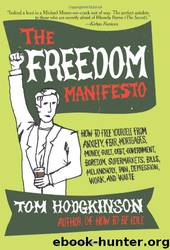Freedom Manifesto by Tom Hodgkinson

Author:Tom Hodgkinson [Hodgkinson, Tom]
Language: eng
Format: epub
15 Banish Loneliness
Society has parted man from man, Neglectful of the universal heart.
Wordsworth, Prelude, 1850
One of the most terrible effects of the Reformation and then the Protestant revolution was the introduction of loneliness on a grand scale. The old medieval Catholic theology encouraged a collective approach to life. For them, it was a literal truth that God was other people; we were all in this together. If the things you do benefit the whole of society, then you are working for God and for your own salvation. Thus the emphasis on charity and hospitality. As in primitive societies, it would be frowned upon to turn a hungry wanderer from your door. Monks and nuns opened 'hospitals' which provided hospitality in the form of beer and bread and sleep. The medievals, like the poets of antiquity, hankered after a lost golden age in which, as Gnaeus Pompeis Trogus wrote: 'Nobody was a slave and nobody had any private property either; all things were held in common and without division, as though there was one single inheritance for all men.' They therefore introduced customs that tried to recreate a kind of communality. It was the era of 'love thy neighbour' and the 'brotherhood of man'. Such ideas now seem revolutionary. The modern commonsense myth - 'You're on your own in this world' - was unknown. 'Love thy neighbour' has been replaced with 'keeping up with the Joneses'; fraternity with covetousness.
Medieval buildings were the result of a vast collective and creative effort on behalf of the various guilds of the city: 'A medieval building appears - not as a solitary effort to which thousands of slaves would have contributed the share assigned to them by one man's imagination; all the city contributed to it,' wrote Kropotkin, who goes on to quote the words of the Council of Florence: 'No works must be begun by the commune but such as are conceived in response to the grand heart of the commune, composed of all the hearts of all the citizens, united in one common will.'
In less developed countries today, you see people moving around in large groups - not alone as we do on our underground trains and buses. In Mexico, for example, trucks go by containing twenty people. Kids play in large gangs. Whole families sit outside their shops all day. Even in the supermarkets - those terrible institutions which tend to make make shopping such a lonely experience - Mexicans chat and laugh and gossip. In old-fashioned Catholic societies, we can catch a glimpse of what medieval life in England must have been like.
A new approach to life emerged in the seventeenth century, when Calvin and others insisted that man was engaged primarily on a lonely journey towards salvation. The principal text that created or reflected this new loneliness in the UK was John Bunyan's bestseller, A Pilgrim's Progress (1678-84). Bunyan lived from 1628 to 1688 and was imprisoned for twelve years for preaching without a licence. In A Pilgrim's Progress, probably
Download
This site does not store any files on its server. We only index and link to content provided by other sites. Please contact the content providers to delete copyright contents if any and email us, we'll remove relevant links or contents immediately.
| Coloring Books for Grown-Ups | Humor |
| Movies | Performing Arts |
| Pop Culture | Puzzles & Games |
| Radio | Sheet Music & Scores |
| Television | Trivia & Fun Facts |
Spell It Out by David Crystal(36117)
Professional Troublemaker by Luvvie Ajayi Jones(29663)
The Secret History by Donna Tartt(19092)
We're Going to Need More Wine by Gabrielle Union(19046)
Cat's cradle by Kurt Vonnegut(15357)
The Goal (Off-Campus #4) by Elle Kennedy(13674)
The Social Justice Warrior Handbook by Lisa De Pasquale(12190)
The Break by Marian Keyes(9368)
Crazy Rich Asians by Kevin Kwan(9292)
The remains of the day by Kazuo Ishiguro(9000)
Thirteen Reasons Why by Jay Asher(8912)
Educated by Tara Westover(8054)
The handmaid's tale by Margaret Atwood(7767)
Giovanni's Room by James Baldwin(7346)
Win Bigly by Scott Adams(7199)
This Is How You Lose Her by Junot Diaz(6888)
The Rosie Project by Graeme Simsion(6415)
Six Wakes by Mur Lafferty(6259)
The Power of Now: A Guide to Spiritual Enlightenment by Eckhart Tolle(5784)
